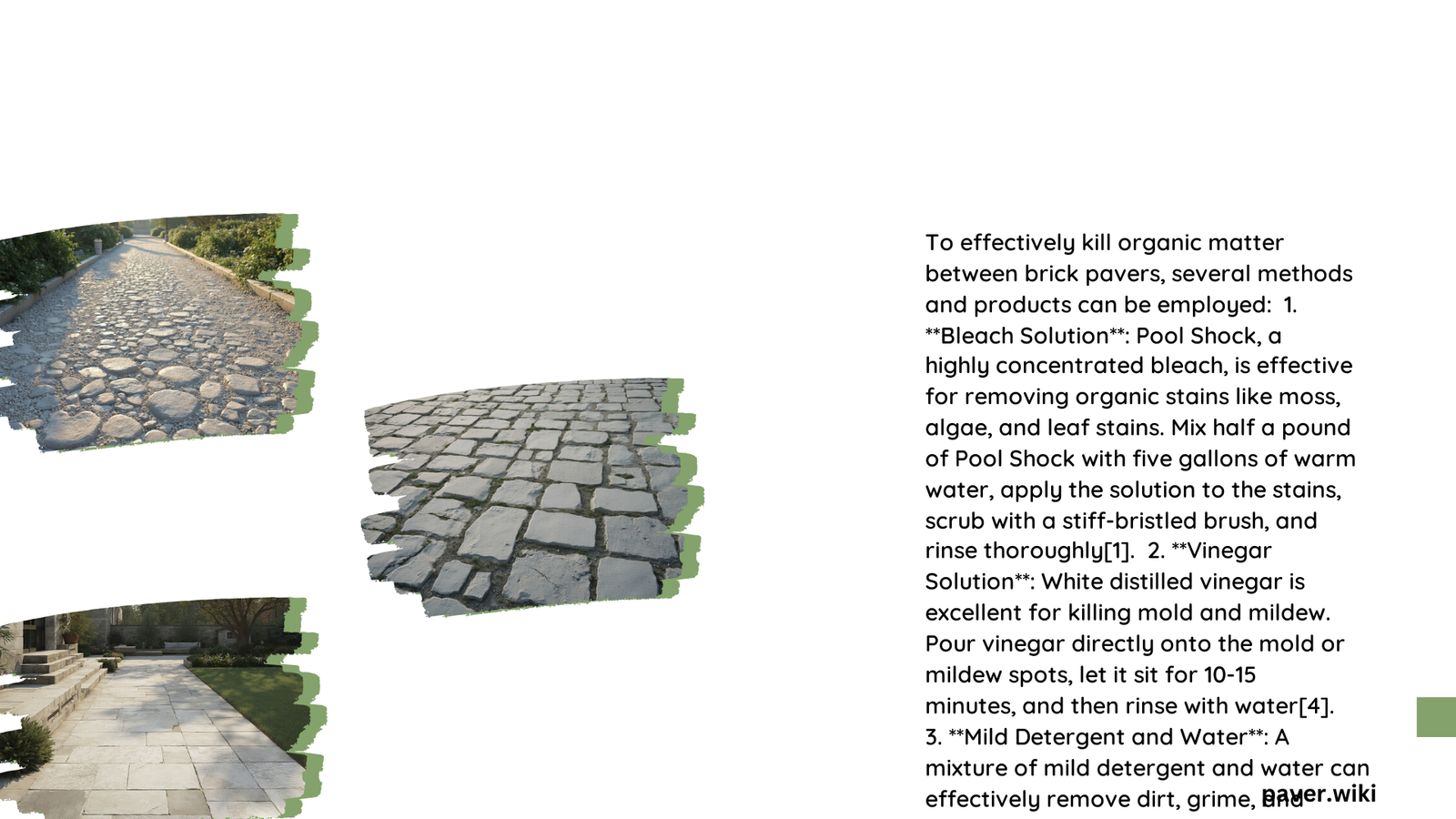Effective methods for eliminating organic matter between brick pavers include using sodium hydrochloride (liquid pool chlorine), copper sulphate solutions, eco-friendly mixtures of vinegar and baking soda, boiling water, and pressure washing. These techniques target moss, algae, weeds, and other organic debris, ensuring clean and well-maintained pavers. Regular maintenance and proper application of these methods can significantly reduce organic growth and preserve the aesthetic appeal of brick paver surfaces.
What Are the Most Effective Chemical Solutions?
Sodium Hydrochloride (Liquid Pool Chlorine)
Sodium hydrochloride, commonly known as liquid pool chlorine, is highly effective in removing moss, algae, and slime from brick pavers. Here’s a step-by-step guide:
- Wet the pavers with a hose
- Saturate surrounding garden areas
- Apply a 10:1 water-to-chlorine solution
- Scrub with a stiff broom
- Leave for 20 minutes
- Rinse thoroughly
This method is particularly useful for heavy organic buildup and can quickly restore the appearance of your pavers.
Copper Sulphate for Prevention
To prevent organic matter from recurring, copper sulphate is an excellent choice:
- Mix 15mg of copper sulphate per 1 liter of water
- Apply to dry pavers
- Leave for 1 hour
- Rinse thoroughly
Copper sulphate creates an environment hostile to organic growth, making it an effective long-term solution.
What Are the Eco-Friendly Alternatives?

For those seeking environmentally conscious options, several natural methods work well:
- Vinegar and Baking Soda Mixture:
- Equal parts white vinegar and water
- Add baking soda to create a paste
- Apply to affected areas
- Scrub with a stiff brush
-
Rinse thoroughly
-
Boiling Water:
- Simply pour boiling water directly on weeds
-
Repeat as necessary
-
Pure Vinegar:
- Pour undiluted vinegar on weeds
- Allow to sit for several hours
- Scrub and rinse
These methods are safe for pets and children, making them ideal for residential areas.
How Does Pressure Washing Compare to Other Methods?
Pressure washing is a powerful tool for removing organic matter when used correctly:
| Aspect | Recommendation |
|---|---|
| Pressure Setting | 1,000 to 2,000 PSI |
| Nozzle Type | Wide-angle tip |
| Cleaning Solution | Mild detergent or specialized paver cleaner |
Steps for effective pressure washing:
- Apply cleaning solution
- Let sit for a few minutes
- Use a handheld nozzle for targeted cleaning
- Rinse thoroughly
Pressure washing can cover large areas quickly but requires care to avoid damaging the pavers.
What Are the Best Preventative Measures?
Prevention is key to maintaining clean brick pavers:
- Regular sweeping with a broom or leaf blower
- Periodic rinsing with a garden hose
- Addressing drainage issues to prevent water accumulation
- Applying sealants to create a protective barrier
Implementing these practices can significantly reduce the frequency of deep cleaning required.
How Do Costs and Timing Affect Treatment Choices?
Consider the following when choosing a treatment method:
- Chemical solutions: $5-$20 for materials
- Eco-friendly options: Less than $5 for household items
- Pressure washer: $50-$200 for equipment
- Specialized cleaners: $10-$30 per bottle
Timing is crucial:
- Apply treatments during dry, sunny weather
- Perform seasonal maintenance in late summer
- Address organic growth promptly to prevent spread
Balancing cost, effectiveness, and environmental impact will help determine the best approach for your specific situation.
What Challenges Might Arise During Treatment?
Several challenges may occur when treating organic matter:
- Ensuring proper drainage to prevent moisture accumulation
- Avoiding damage to paver surfaces, especially with pressure washing
- Maintaining consistent treatment schedules
- Balancing effectiveness with environmental concerns
- Adapting methods for different types of organic matter (moss vs. weeds)
Addressing these challenges requires careful planning and execution of your chosen treatment method.
By understanding and implementing these various techniques, you can effectively manage and eliminate organic matter between brick pavers, maintaining their appearance and structural integrity for years to come.
References:
1. Cleaning Bricks and Pavers
2. How to Clean and Maintain Your Brick Pavers
3. Eco-Friendly Cleaning Tips for Organic Debris on Pavers
